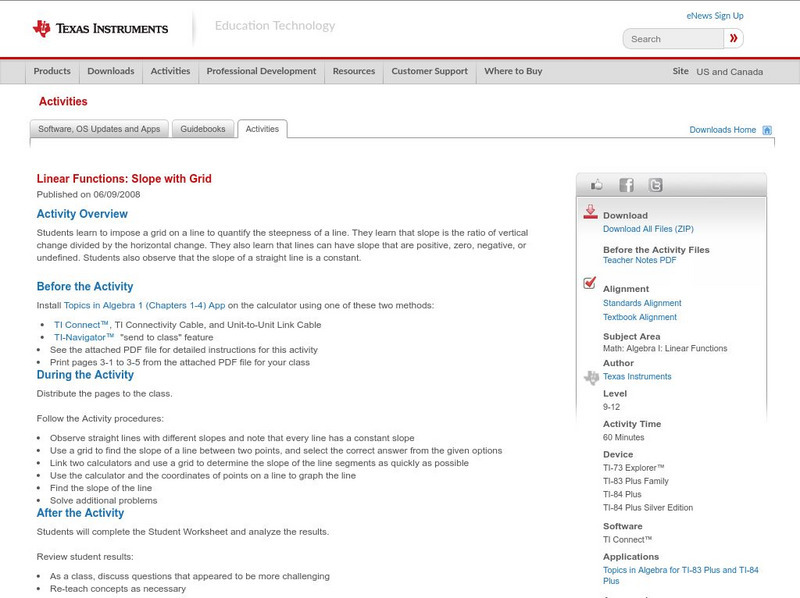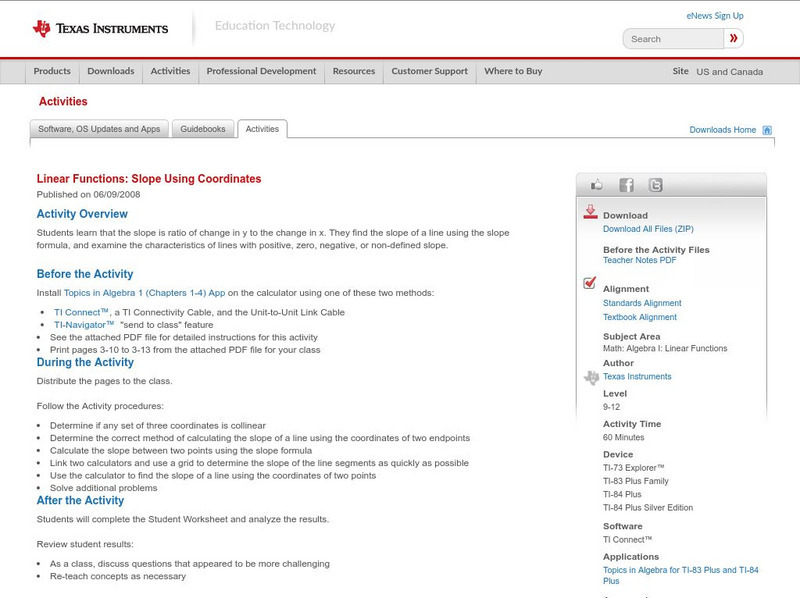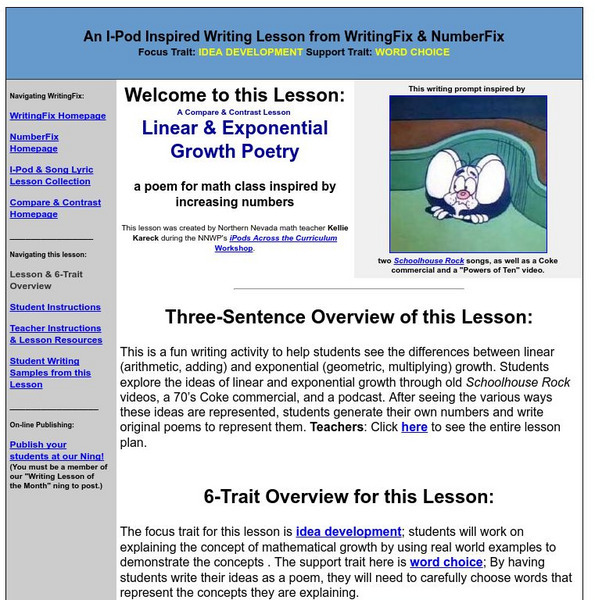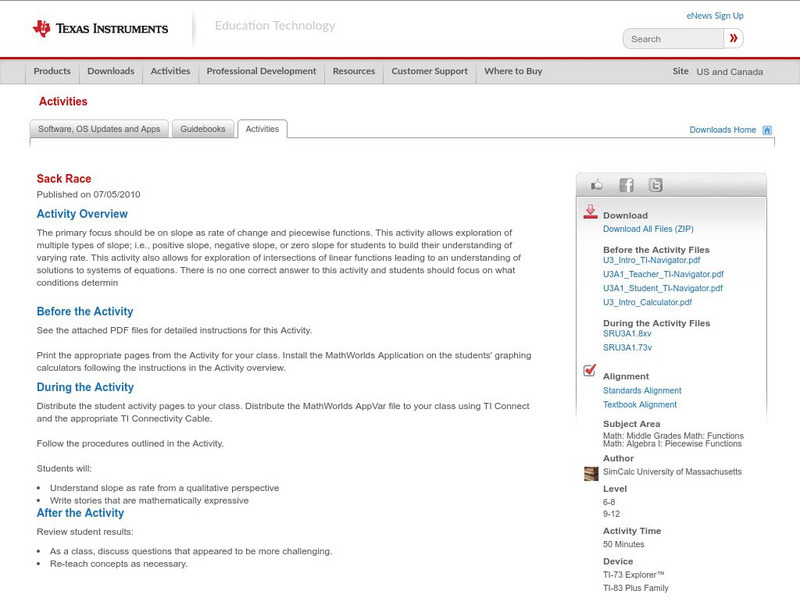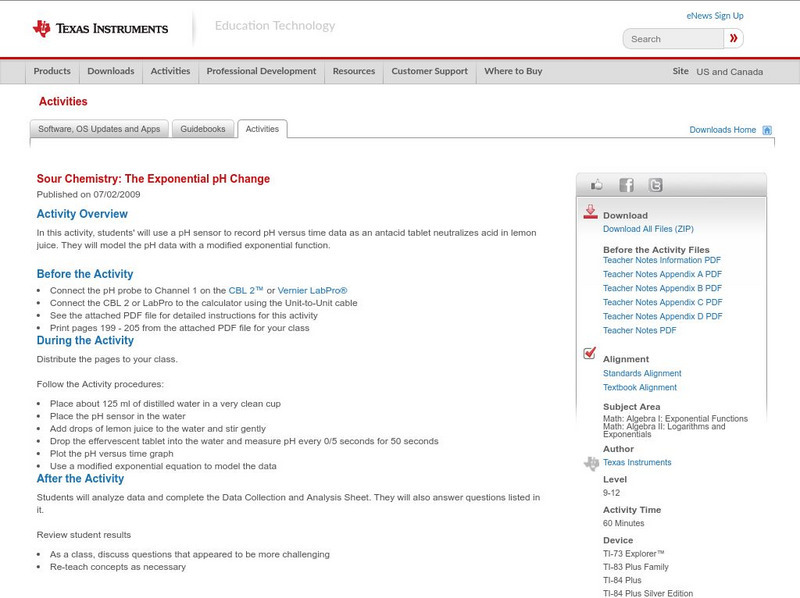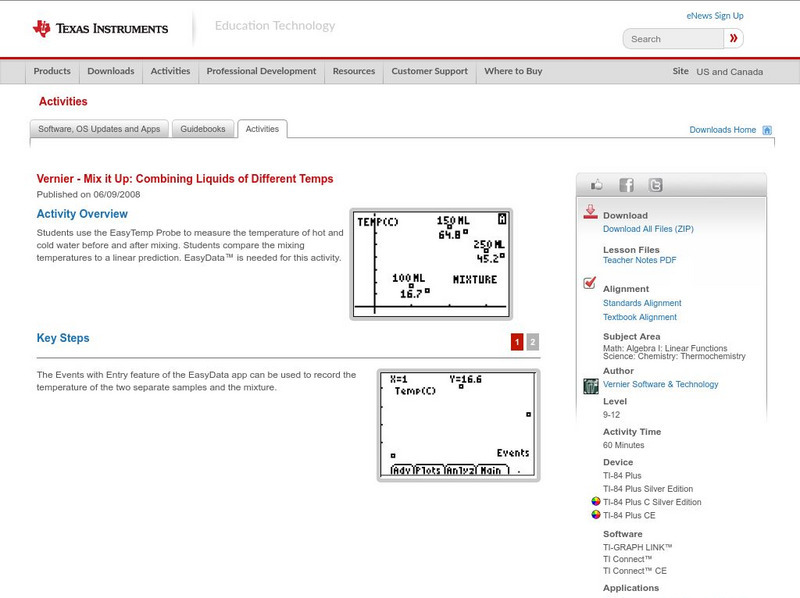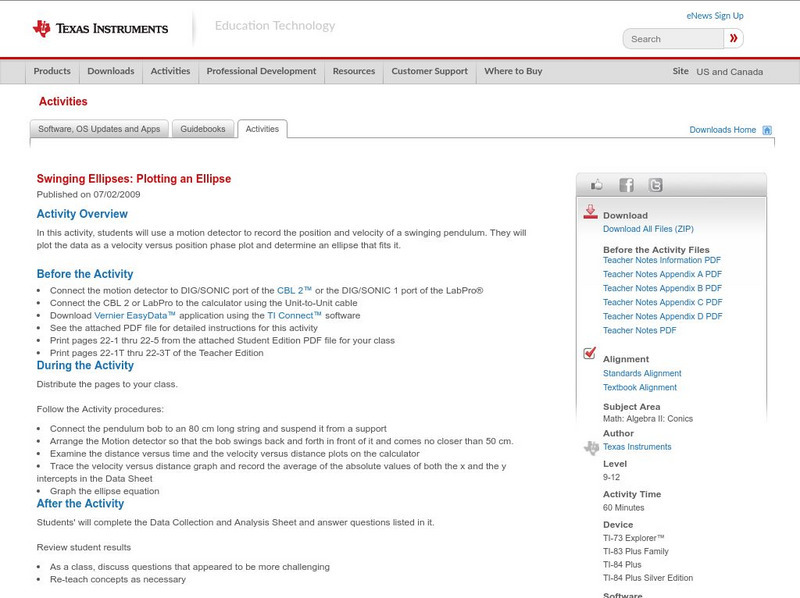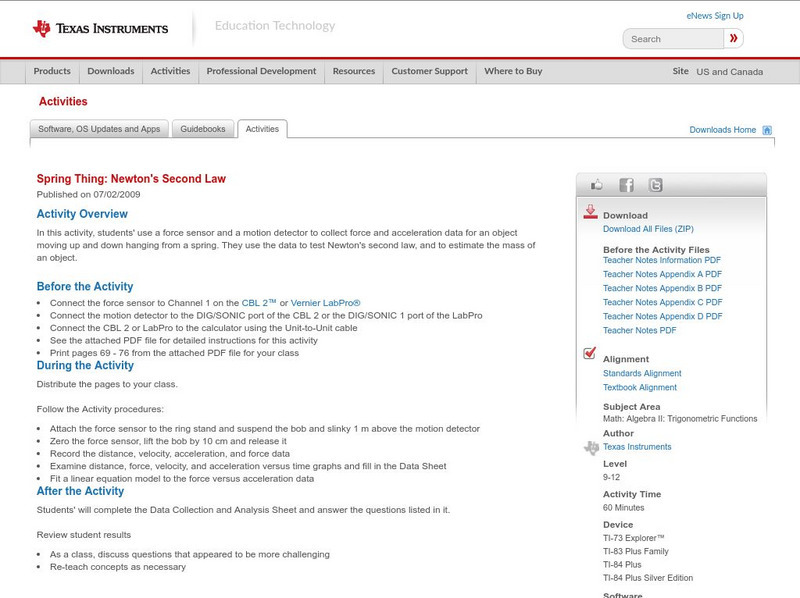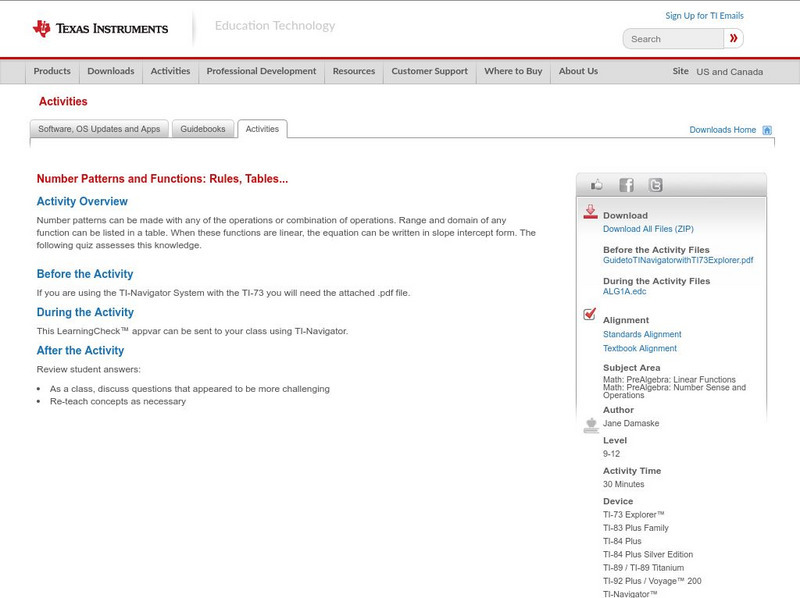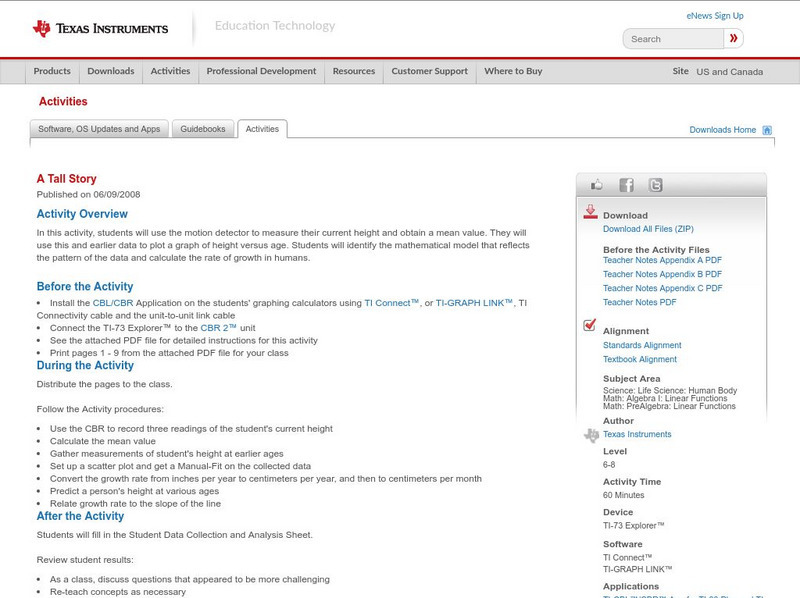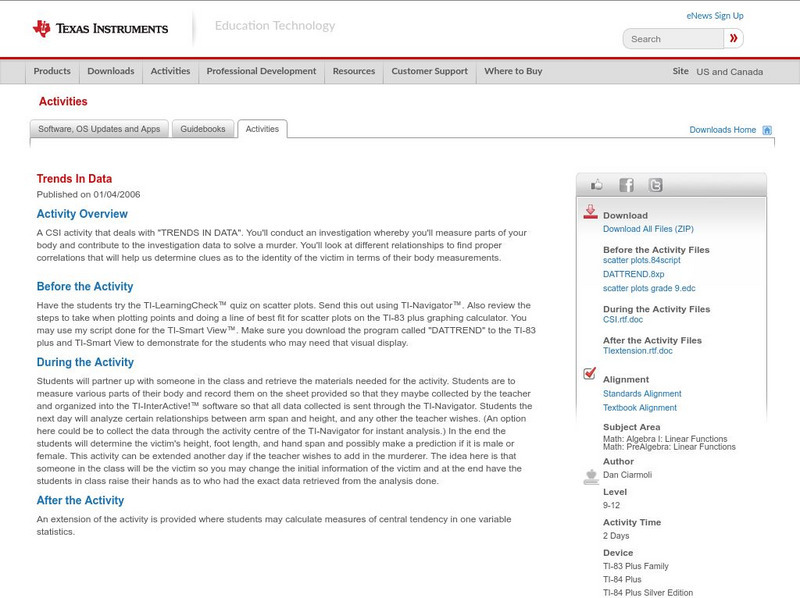Hi, what do you want to do?
Texas Instruments
Texas Instruments: Linear Functions: Slope Intercept Form
Students learn to develop the equation of a line from its graph. They also learn to write the equation of a line from the slope and the y-intercept, a point and the slope, and two points. They also investigate slopes of lines that are...
Shodor Education Foundation
Shodor Interactivate: Lesson: Functions and the Vertical Line Test
This lesson plan outlines an activity that allows students to explore the vertical line test for functions.
Texas Instruments
Texas Instruments: Linear Functions: Slope With Grid
Students learn to impose a grid on a line to quantify the steepness of a line. They learn that slope is the ratio of vertical change divided by the horizontal change. They also learn that lines can have slope that are positive, zero,...
Texas Instruments
Texas Instruments: Linear Functions: Slope Using Coordinates
Students learn that the slope is ratio of change in y to the change in x. They find the slope of a line using the slope formula, and examine the characteristics of lines with positive, zero, negative, or non-defined slope.
Texas Instruments
Texas Instruments: Mc Dougal Littell Middle School Math: Graph Linear Functions
Students will graph the equations and determine if the viewing window is appropriate for the graphs.
Shodor Education Foundation
Shodor Interactivate: Number Cruncher
The interactive activity has students explore simple linear functions by looking for patterns in the outputs to determine the function. The activity and teacher resources are included.
Shodor Education Foundation
Shodor Interactivate: Whole Number Number Cruncher
The interactive activity has students explore simple linear functions involving whole numbers by looking for patterns in the outputs to determine the function. The activity and teacher resources are included.
Texas Instruments
Texas Instruments: Picnic Challenge
In this activity, students find patterns to solve problems, explore functions, and graph linear functions on the coordinate plane.
Writing Fix
Writing Fix:i Pod Inspired Writing Lesson:linear & Exponential Growth Poetry
This is a writing activity perfect for a math class, it's designed to help students see the differences between linear (arithmetic, adding) and exponential (geometric, multiplying) growth. Students explore the ideas of linear and...
TeachEngineering
Teach Engineering: Applications of Linear Functions
This lesson plan culminates the unit with the Go Public phase of the legacy cycle. In the associated activities, students use linear models to depict Hooke's law as well as Ohm's law. To conclude the lesson plan, students apply they've...
Texas Instruments
Texas Instruments: Sack Race
The primary focus should be on slope as rate of change and piecewise functions. This activity allows exploration of multiple types of slope; i.e., positive slope, negative slope, or zero slope for students to build their understanding of...
Texas Instruments
Texas Instruments: Explore Graphs and Factors
Students use a graphing calculator to explore the relationship between the linear factors of a quadratic function and its zeros. They learn that the x-intercepts and axis of symmetry of a quadratic function can be determined from its...
Texas Instruments
Texas Instruments: Stay Tuned: Sound Waveform Models
In this activity, students' will record the sound waveform of a tuning fork and analyze the waveform to determine frequency, period and amplitude information. They will model the waveform using trigonometric functions.
Texas Instruments
Texas Instruments: Sour Chemistry: The Exponential P H Change
In this activity, students' will use a pH sensor to record pH versus time data as an antacid tablet neutralizes acid in lemon juice. They will model the pH data with a modified exponential function.
Texas Instruments
Texas Instruments: Mix It Up: Combining Liquids of Different Temps
Students use the EasyTemp Probe to measure the temperature of hot and cold water before and after mixing. Students compare the mixing temperatures to a linear prediction. EasyData is needed for this activity.
Texas Instruments
Texas Instruments: Math Today Challenge Heat Watch
Students will explore linear & quadratic functions to determine how they model the relationship between air temperature & heat index. Once the models are determined students will make predictions about heat index when given a...
Texas Instruments
Texas Instruments: Composing Music Mathematically
This activity is designed to motivate and challenge first year algebra young scholars through a fun introduction to advanced mathematical concepts. It also offers extensions for upper grade level students. Young scholars will recognize...
Texas Instruments
Texas Instruments: Chill Out: How Hot Objects Cool
Students use a temperature probe to collect data as the warmed probe cools. Students investigate Newton's law of cooling and model cooling data with an exponential function. They fit the data to a mathematical model after analysis.
Texas Instruments
Texas Instruments: Swinging Ellipses: Plotting an Ellipse
In this activity, Students can use a motion detector to record the position and velocity of a swinging pendulum. They will plot the data as a velocity versus position phase plot and determine an ellipse that fits it.
Texas Instruments
Texas Instruments: Spring Thing: Newton's Second Law
In this activity, students' use a force sensor and a motion detector to collect force and acceleration data for an object moving up and down hanging from a spring. They use the data to test Newton's second law, and to estimate the mass...
Texas Instruments
Texas Instruments: Stretching a Penny
In this activity, students investigate how a spring stretches when different weights pull on it. They relate the stretch of the spring directly to the weight and vice-versa.
Texas Instruments
Texas Instruments: Number Patterns and Functions: Rules, Tables
Number patterns can be made with any of the operations or combination of operations. Range and domain of any function can be listed in a table. When these functions are linear, the equation can be written in slope intercept form.
Texas Instruments
Texas Instruments: A Tall Story
In this activity, students can use the motion detector to measure their current height and obtain a mean value. They will use this and earlier data to plot a graph of height versus age. Students will identify the mathematical model that...
Texas Instruments
Texas Instruments: Trends in Data
A CSI activity that deals with "TRENDS IN DATA". You'll conduct an investigation whereby you'll measure parts of your body and contribute to the investigation data to solve a murder. You'll look at different relationships to find proper...







